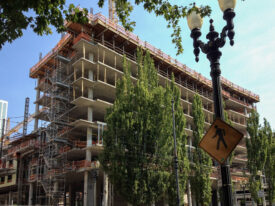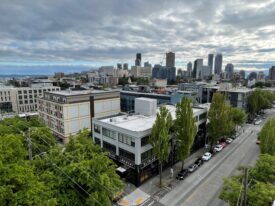February 9, 2023
MEDIA CONTACT: Anna Fahey, anna@sightline.org
POLL RESULTS: sightline.org/WApoll2023
WASHINGTON STATE – Majorities in Washington state favor a wide range of policy changes to make it easier to build multi-family housing to address the state’s housing affordability crisis. A new poll from a bipartisan team comprising FM3 Research and New Bridge Strategy found that 71 percent of likely Washington state voters—across partisan lines and demographics—support legislation to eliminate single-family zoning and allow more homes like duplexes and 4-unit apartment buildings. Majorities would support this kind of policy change even if it meant duplexes or triplexes would be built in their neighborhood or next door to them.
In addition, the poll found that voters understand a restricted supply of housing to be driving up home prices and rents: fully 72 percent saying a shortage of housing is a “major” cause of housing unaffordability. Two-thirds of respondents identify factors such as excessive parking, design, and environmental requirements as contributing to high costs. By a 40-point margin, Washington voters also favor cities allowing a range of housing types over strict local control about what type of housing is allowed.
The findings underscore public will for proposals currently under consideration in Olympia to address the statewide housing shortage, including many that have recently passed out of their committees of origin. (This list is not inclusive of a robust suite of complementary bills to protect tenants and stabilize housing.) As of today:
- HB 1026 (Walen) – Concerning local government design review
- HB 1042 (Walen) – Concerning the use of existing buildings for residential purposes
- HB 1110 (Bateman, Barkis) – Increasing middle housing in areas traditionally dedicated to single-family detached housing
- HB 1111 (Ryu) – Concerning housing benefit districts
- HB 1167 (Duerr) – Concerning residential housing regulations
- HB 1245 (Barkis) – Increasing housing options through lot splitting
- HB 1293 (Klicker) – Streamlining development regulations
- HB 1337 (Gregerson) – Expanding housing options by easing barriers to the construction and use of accessory dwelling units
- HB 1351 (Reed) – Prohibiting the imposition of minimum parking requirements except under certain circumstances
- HB 1611 (Reed) – Concerning local government permitting
- SB 5045 (Kuderer) – Incentivizing rental of accessory dwelling units to low-income households
- SB 5190 (Trudeau) – Increasing middle housing in areas traditionally dedicated to single-family detached housing
- SB 5364 (Frame) – Increasing housing options through lot splitting
- SB 5412 (Salomon) – Reducing local governments’ land use permitting workloads
- SB 5466 (Liias) – Promoting transit-oriented development
Several more await imminent executive committee votes this week:
- SB 5235 (Shewmake) – Concerning accessory dwelling units
- SB 5456 (Frame) – Prohibiting the imposition of minimum parking requirements except under certain circumstances
“The shortage isn’t just an abstract concept for people. We’re living it, whether it’s our own family or someone we know struggling to afford their home,” says Anna Fahey, of think tank Sightline Institute, which commissioned the poll. “It’s also costing us in long commutes, traffic, increasing homelessness, businesses that can’t find workers to keep the doors open, and unrelenting pressure to sprawl out into our rural areas. Poll after poll signals that Washingtonians want this to change. The good news is that we know exactly how to lift the housing restrictions in our cities that keep prices and rents so high, and we have the tools to make sure our communities have enough homes people can afford.”
See the poll results at sightline.org/WApoll2023.
###
Anna Fahey is Senior Director of Communications and Campaigns at Sightline Institute.
Sightline Institute is a nonpartisan, nonprofit think tank providing leading original analysis of housing, democracy, forests, and energy policy in the Pacific Northwest, Alaska, British Columbia, and beyond.






